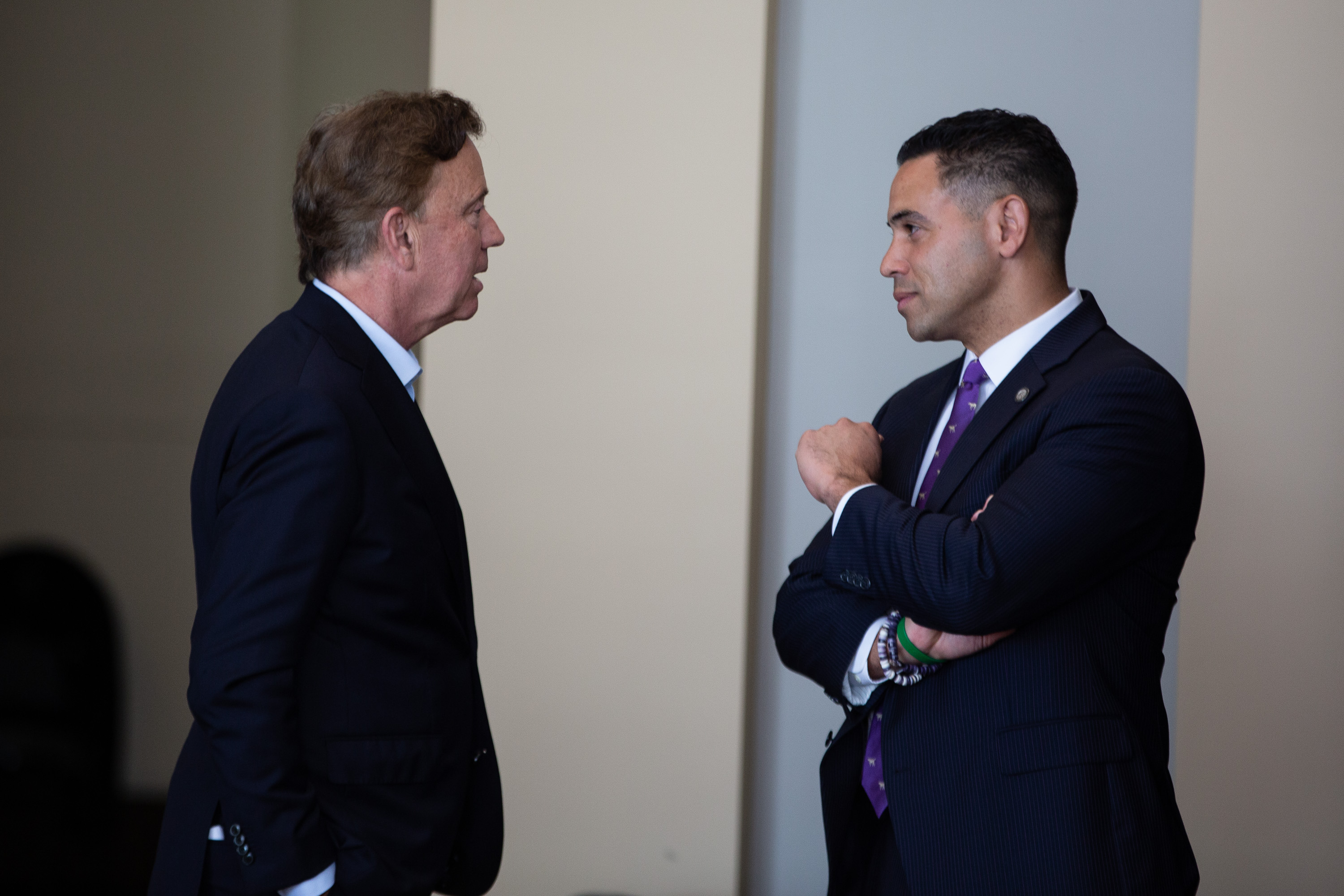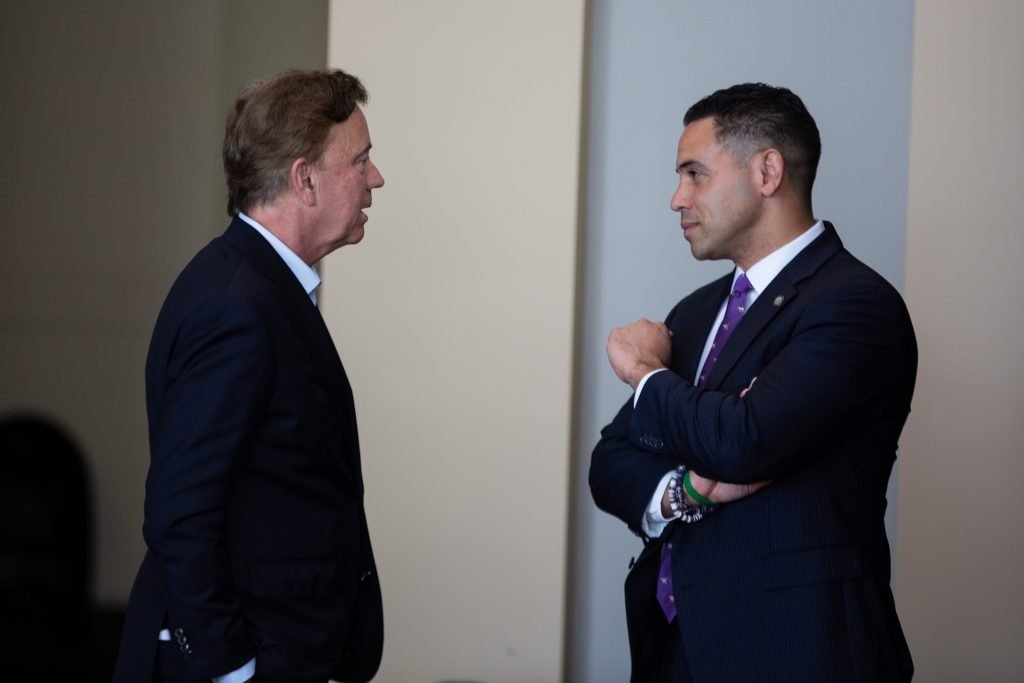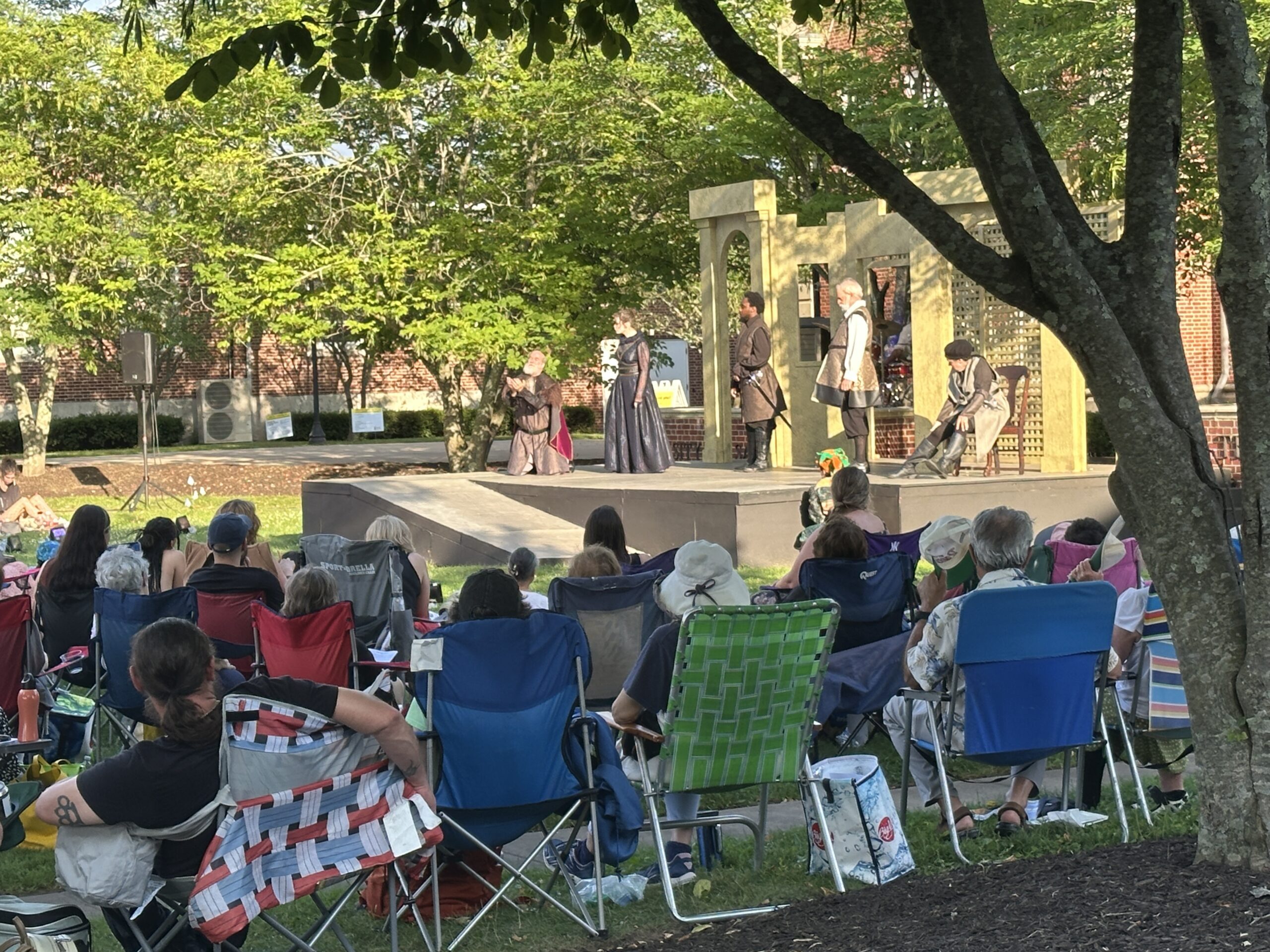Lamont and Tribes Deadlock Over Sports Betting

Audio By Carbonatix

Gov. Ned Lamont and Rodney Butler, the chairman of the Mashantucket Pequot tribal nation, last year as sports-betting talks broke down for the first time. Photo credit: Frankie Graziano, Connecticut Public Radio, (courtesy of CTMirror.org)
Gov. Ned Lamont endorsed legalizing sports betting under terms opposed by the tribal owners of Foxwoods Resort and Mohegan Sun.
By Mark Pazniokas, CTMirror.org
Gov. Ned Lamont dealt a serious blow Tuesday to sweeping legislation that would give the state’s two federally recognized tribes exclusive rights to take bets on sports, open a casino in Bridgeport, and offer virtual casino games on smartphones and computers.

Gov. Ned Lamont and Rodney Butler, the chairman of the Mashantucket Pequot tribal nation, last year as sports-betting talks broke down for the first time. Photo credit: Frankie Graziano, Connecticut Public Radio, (courtesy of CTMirror.org)
In the administration’s clearest public statement on gambling, the governor endorsed a competing bill that would legalize only sports betting, but under terms opposed by the tribal owners of Foxwoods Resort and Mohegan Sun. They claim exclusive rights to sport bookmaking, should it be legalized in Connecticut.
The governor is proposing that sports betting be allowed at the two tribal casinos and that rights to sports bookmaking outside the casinos be opened to the tribes, the Connecticut Lottery and Sportech, the licensed vendor for off-track betting. The tribes rejected the offer in a private meeting Monday at the governor’s office.
“The governor is committed to a fair resolution that brings Connecticut’s gaming economy into the 21st century,” said Max Reiss, Lamont’s communication director. “He wants to sign a sports betting bill into law over the next few months.”
But Reiss pointedly added that “any such proposal, however, must be designed to avoid and withstand endless legal challenges.” That means Lamont’s support is contingent on the tribes agreeing to share off-reservation sports betting.
“We would be forced to oppose that. We believe we have exclusive rights to to sports betting,” said Chuck Bunnell, the chief of staff to the Mohegan tribe and one of the officials who met Monday with the governor. “We would be forced to litigate.”
Rodney Butler, the chairman of the Mashantucket Pequots, said the governor made clear that his position was final.
“I think the governor was firm in his position – that this is his position and there is no discussion, literally to the point of throwing up his hands and saying, ‘This is just too hard and we’ll wait another year,’” Butler said.
The tribes and the administration have been at a stalemate over sports betting, with the tribes claiming that their exclusive rights to casino games in Connecticut cover sports betting if legalized in the state.
A bill proposed by Sen. Cathy Osten, D-Sprague, and endorsed by Senate Democratic leaders, would give the tribes exclusive rights to sports betting at the casinos and online throughout the state, plus the rights to “iGaming,” which is the ability to offer virtual casino games on smartphones and computers.
Osten’s bill and a measure reflecting the governor’s position were up for a public hearing Tuesday before the legislature’s Public Safety and Security Committee, which has jurisdiction over gambling legislation. Osten said she was aware of the governor’s message to the tribes, but she would continue to push her bill forward.
Each side has significant leverage.
Under the exclusivity deal struck by Gov. Lowell P. Weicker Jr. in the early 1990s, the tribes pay the state 25% of the gross gaming revenue generated by slots machines. If the exclusivity is violated, the tribes no longer have to make the payments, which totaled $255 million last year.
While tribal casinos generally are allowed to offer any form of gambling otherwise offered in their home states, that is not automatic. If the legislature legalizes sports betting in Connecticut, the tribes could not offer sports books at the casinos without the governor negotiating amendments to their gambling compacts with the state.
Osten’s bill directs the governor to negotiate amendments to the compact, but the administration’s legal position is that cannot be enforced.
Rep. Joe Verrengia, D-West Hartford, the co-chair of the public safety panel, asked Butler at the hearing if the tribes would withhold slots payments if the measured favored by Lamont became law.
“We would have to, correct,” Butler said.
It won’t be necessary. The Lamont administration has no intention of going forward with sports betting without an agreement with the tribes.
The lawmakers quizzed Butler and other tribal officials about the basis of their claim that sports betting was covered by agreements finalized in 1994, when sports wagering was illegal outside Nevada.
The federal Indian Gaming Regulatory Act of 1988 did not address sports betting, but the National Indian Gaming Commission has defined it as a Class III game under federal law, a category that includes what generally are seen as casino games, as well as keno.
The state and the tribes successfully negotiated a deal that allows the Connecticut Lottery to run keno, giving the tribes a share of the net profits. That raised an obvious question Tuesday: If a negotiated deal on keno was acceptable, why not sports betting?
“It was acceptable, because it was a collaborative process,” Butler told reporters. “And this, this hasn’t been.”
George Henningsen, the chairman of the Mashantucket Pequot gaming commission, told legislators that if the state and tribes took the exclusivity question to court, a judge would have to consider, “What did the parties intend in April of 1994?”
He suggested an answer: “Well, certainly in 1994, the only place that anyone could address sports betting was in the casinos in Nevada.”
The administration and the tribes have been trying for more than a year to negotiate a path forward, a conversation opened by Lamont’s predecessor, Gov. Dannel P. Malloy.
“For years now, Connecticut’s gaming economy has been declining and stuck in litigation while our surrounding states continue to expand and prosper,” Reiss said. “Last legislative session, the governor worked to achieve a comprehensive solution to Connecticut’s ongoing gaming quagmire. Unfortunately, neither tribe accepted that proposal.”
Osten said she has yet to hear directly from the administration about its opposition to her bill.
“Let’s at least start focusing just on sports betting,” Lamont told reporters after a public event Tuesday. “That’s something we can do. We can do that on a finite basis, we get that rolled out, and then we grow from there. But let’s get something done.”
Ostein proposed her bill at a press conference in January that underlined lawmakers’ frustration about the inability of the tribes and the administration to come to terms on sports betting. To generate broader support in the legislature, Osten’s bill would direct a greater share of gambling revenues to cities and towns.
In 2018, the U.S. Supreme Court struck down a federal law that limited sports books to Nevada. At least 14 states have since legalized sports betting.
MGM Resorts International, which operates casinos in Springfield, MA, and Yonkers, NY, that compete with the Connecticut casinos, has lobbied for years to block the state from awarding greater gambling rights to the tribes, arguing it could get a better deal on a new casino with open bidding.
The bill endorsed by Lamont would not open bidding to MGM.
The legislature voted in 2017 to give a joint tribal venture the authority to build the casino in East Windsor that would compete with MGM Springfield. MGM is suing to block the project, claiming that the federal Department of Interior erred in accepting necessary amendments to the tribes’ gaming compacts with Connecticut. A zoning dispute in East Windsor also is yet to be resolved.
Reprinted with permission of The Connecticut Mirror. The author can be reached at [email protected].
Like what you see here? Click here to subscribe to We-Ha’s newsletter so you’ll always be in the know about what’s happening in West Hartford!



